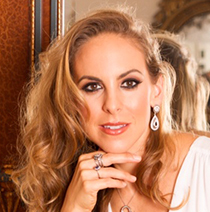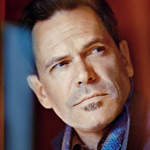Dawn Derow
Legit: A Classical Cabaret
Laurie Beechman Theatre, NYC, March 15, 2016
Reviewed by Victoria Ordin for Cabaret Scenes
 Seeing the final performance of a cabaret show that won a Bistro Award for the performer is like seeing the movie that won for Best Picture a month after the Oscars (Slumdog Millionaire comes to mind): you’re invariably disappointed because of all the hype. But Dawn Derow’s ambitious Legit: A Classical Cabaret does not disappoint. The Boston Conservatory-trained opera singer, who just turned 40 (and so performed this show as part of Carolyn Montgomery-Forant’s Stronger Stuff series), has both a luminous voice and real dramatic flair one rarely sees in cabaret, even among those who have crossed into musical theater from opera.
Seeing the final performance of a cabaret show that won a Bistro Award for the performer is like seeing the movie that won for Best Picture a month after the Oscars (Slumdog Millionaire comes to mind): you’re invariably disappointed because of all the hype. But Dawn Derow’s ambitious Legit: A Classical Cabaret does not disappoint. The Boston Conservatory-trained opera singer, who just turned 40 (and so performed this show as part of Carolyn Montgomery-Forant’s Stronger Stuff series), has both a luminous voice and real dramatic flair one rarely sees in cabaret, even among those who have crossed into musical theater from opera.
Unlike many shows which, for no reason I can understand open with the weakest numbers in the show, Legit bursts out of the starting gate, or in this case, the back of the Laurie Beechman Theatre, from which Derow makes her flirtatious entrance. “Quando Me’n Vo,” (“Musetta’s Waltz”) from Puccini’s La Bohème and “O Mio Babbino Caro” (“Oh My Beloved Father”) from Gianni Schicchi were beautifully rendered, yet appropriately scaled down for the venue. Sierra Boggess did the same piece in her last cabaret show at Feinstein’s/54 Below, Awakenings, and, while their phrasing differs slightly, Derow’s Musetta calls to mind that of the Broadway star best known as Ariel in The Little Mermaid.
Moving the clock forward some 60 years, Derow performed two arias from American composer Douglas Moore’s most famous work, The Ballad of Baby Doe: “Willow Song” and “The Silver Aria.” Less well-known to contemporary audiences than his own, Moore’s work defies categorization. Influenced greatly by ragtime and jazz, as well as folk, Moore often drew comparisons to Aaron Copland, yet is best known for the opera in which these melancholy arias appear. As with the Puccini, Derow offered just enough backstory for the uninitiated to enjoy the music, but not so much that the show feels like a lecture.
After the 20th-Century interlude, Derow returned to the 19th century with an excellent “Mi Chiamano Mimi” (Puccini). Guest tenor Victor Khodadad sang “Rodolfo’s Aria” competently, but it was Derow’s duet with the transcendent Celia Berk, Leo Delibes’ “Lakmé” (“The Flower Duet”) that left one awestruck.
“Lakme” provided a nice transition to the most extended patter of the show, Derow’s explanation of how opera gave way to musical theater. Basically, in the 1920s, composers began to write music at a lower register which more closely approximated human speech. “Bill” (Jerome Kern/Oscar Hammerstein/P.G. Wodehouse) from Show Boat illustrated the shift, while underlining the essential connection between the two musical genres.
Moving back to the 19th century, but to another country—Germany—Derow sang Strauss’ “My Dear Marquis” (“Laughing Song”), handling the ultra-high notes with ease, but choosing not to sing in German (which she does elegantly, as her few German utterances made clear). When in school, the performer was often tapped for comedic roles, perhaps, she joked, because her teachers thought she was a little “cuckoo”—or at least played cuckoo convincingly.
Musical Director Mark Janas’ skillful arrangement of “Ave Maria”/”For All We Know” (J.S. Bach/Gounod; Fred Karlin/Robb Wilson & Arthur James [psuedonyms of Robb Royer & Jimmy Griffin of the pop group Bread]) preceded a solid “Steal Me, Sweet Thief” from Gian Carlo Menotti’s The Old Maid and the Thief and Verdi’s “Caro Nome,” both deftly sung in the “bel canto” style. Derow finished the show with a fun “Glitter and Be Gay” (Candide) and poignant “Evening Prayer” (Hänsel and Gretel), receiving a much-deserved ovation after a truly original program.





